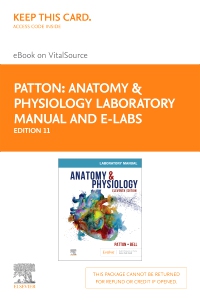
Anatomy & Physiology Laboratory Manual and E-Labs Elsevier eBook on VitalSource (Retail Access Card), 11th Edition
Elsevier eBook on VitalSource - Access Card

Now $102.59
Gain the hands-on practice needed to understand anatomical structure and function! Anatomy & Physiology Laboratory Manual and eLabs, 11th Edition provides a clear, step-by-step guide to dissection, anatomy identification, and laboratory procedures. The illustrated, print manual contains 55 A&P exercises to be completed in the lab, with guidance including instructions, safety tips, and tear-out worksheets. Online, eight eLab modules enhance your skills with simulated lab experiences in an interactive 3-D environment. From noted educators Kevin Patton and Frank Bell, this laboratory manual provides you with a better understanding of the human body and how it works.
-
- Labeling exercises and coloring exercises make it easier to identify and remember critical structures examined in the lab and in lectures
- Step-by-step "check-box" dissection instructions with accompanying illustrations and photos cover anatomical models and fresh or preserved specimens — and provide helpful guidance during dissection labs
- Tear-out Lab Reports contain checklists, drawing exercises, and questions that help demonstrate your understanding of the labs you have participated in, and also allow instructors to check your progress
- 250 illustrations include photos of cat, pig, and mink dissections, photos of various bones, microscopic and common histology slides, and depictions of proper procedures
- Complete lists of materials for each exercise provide handy checklists for planning and setting up laboratory activities, allowing for easy and efficient preparation
- Modern anatomical imaging techniques, such as computed tomography (CT), magnetic resonance imaging (MRI), and ultrasonography, are introduced to demonstrate how new technologies are changing and shaping health care
- Review questions throughout the manual provide tools to reinforce and apply your knowledge of anatomy and function concepts
- Eight eLabs improve the laboratory experience in an interactive digital environment.
- Convenient spiral binding allows for hands-free viewing in the lab setting
- Hint boxes provide special tips on handling specimens, using equipment, and managing lab activities
- Learning objectives at the beginning of each exercise offer a clear framework for learning
-
- NEW! More photos of various types of bones help you learn skeletal anatomy.
- NEW! More microscope slide images, including "zooming in" at high-power magnification, help you learn microscopic anatomy
- NEW! Updated lab tests align with what is currently in use in today’s lab environment
- NEW! Thorough revision of all chapters covers the latest anatomy and physiology lab exercises
-
WELCOME TO THE ANATOMY AND PHYSIOLOGY LABORATORY
The Scientific Method
Measurement and Data Collection
How to Dissect
Using this Manual
Safety First!
How to Study for Lab Quizzes
THE BASICS
1. Organization of the body
2. Dissection: The whole body
3. The Microscope
4. Cell Anatomy
5. Transport through Cell Membranes
6. The Cell's Life Cycle
7. Epithelial Tissue
8. Connective Tissue
9. Muscle and Nerve Tissue
SUPPORT AND MOVEMENT
10. The Skin
11. Overview of the Skeleton
12. The Skull
13. The Vertebral Column and Thoracic Cage
14. The Upper Extremities
15. The Lower Extremities
16. Joints
17. Organization of the Muscular System
18. Skeletal Muscle Identification
19. Dissection: Skeletal Muscles
20. Skeletal Muscle Contractions
INTEGRATION AND CONTROL
21. Nerve Tissue
22. Nerve Reflexes
23. The Spinal Cord and Spinal Nerves
24. The Brain and Cranial Nerves
25. The Dissection: The Brain
26. Somatic Senses
27. Senses of Taste and Smell
28. The Ear
29. Hearing and Equilibrium
30. The Eye
31. Visual Function
32. Endocrine Glands
33. Hormones
REGULATION AND MAINTENANCE
34. Blood
35. Structure of the Heart
36. Electrical Activity of the Heart
37. The Pulse and Blood Pressure
38. The Circulatory Pathway
39. The Lymphatic System
40. Dissection: Cardiovascular and Lymphatic Systems
41. Respiratory Structures
42. Dissection: Respiratory System
43. Pulmonary Volumes and Capacities
44. Digestive Structures
45. Dissection: Digestive System
46. Enzymes and Digestion
47. Urinary Structures
48. Dissection: Urinary System
49. Urinalysis
REPRODUCTION
50. The Male Reproductive System
51. The Female Reproductive System
52. Dissection: Reproductive Systems
53. Development
54. Genetics and Heredity
SYNTHESIS
55. The Whole Body
LAB REPORT SUPPLEMENT





 as described in our
as described in our 